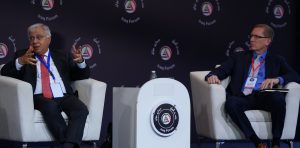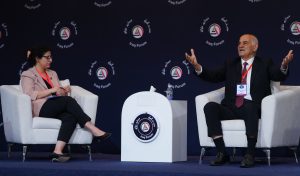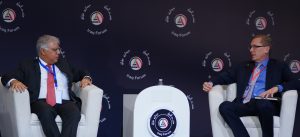- Awn Thiab Abdulla, Minister of Water Resources, Iraq
- Fareed Yaseen, Iraq’s Climate Envoy
- Benjamin Thomson, Economic Counselor, US Embassy in Iraq
- Zeinab Shuker, Sam Houston State University, USA (Moderator)
Water stress is a severe issue across vast parts of the Euphrates and Tigris rivers, challenging cross-border water governance and cooperation among Turkey, Syria, Iraq and Iran. In this panel, policy makers and experts discussed the environmental challenges facing the country, and the government’s urgent need for strategies to mitigate the worst effects of climate change, including also man-made environmental pollution and damage, with a focus on the pressing need to prioritise water management and address reduced water flow from neighbouring countries to ensure that Iraq maintains adequate water supplies.
The United Nations Environment Programme (UNEP) has long warned that the water available in Iraq is set to decrease by around 20 percent by 2025, threatening the long-term stability of Iraq’s agriculture and industry. A UN report as far back as 2012 warned that the water level of both the Tigris and the Euphrates rivers has fallen by more than 60 percent over the last 20 years partially as a result of upstream water use and damming in Turkey and Iran. Downstream in Iraq, as the sea levels rise in the Persian Gulf, salt water from the Shatt al-Arab basin is pushing far up along the river, causing farming land in southern Iraq to become saltier, ruining drinking water supplies and rendering much agricultural water unusable; more than 80 percent of the basin’s water is used in agriculture.
Although primarily addressing this urgent threat and what to do about it, the panel also touched on other environmental challenges facing the country, including the continued practice of gas flaring, where oil wells burn the excess gas they can’t store or use, which releases chemicals including benzene that are known to cause cancer. Cancer, asthma, allergies, lung fibrosis and stillbirths are all associated with long term exposure to gas flaring, and communities living close to Iraq’s oil fields have been found at elevated risk of these diseases.

This session opened with a one-minute silence to Ali Hussein Julood, 21, who grew up next to the Rumaila oil field in Basra and died of leukaemia. The Minister of Water Resources, Awn Thiab Abdulla, broke silence by stating: “I’ve been working in this field of water resources for many years. He added that “90% of Iraq’s water comes from Turkey, Syria and Iran”, attributing part of the shortages Iraq experiences from neighbouring countries. The Tigris and the Euphrates rivers both originate in Turkey. The former flows directly to Iraq and other tributaries from Iraq flow into it. The Euphrates crosses Syria before entering Iraq and joining Tigris in Basra Province to form Shat Al-Arab.
Iraq was the first country in the region to introduce the ‘dripping’ practice, the Minister told the audience: trickle irrigation that involves dripping water onto the soil at very low rates. The impact of sanctions before the regime-change also impacted the country’s worsening situation, he said. “[But], we have to put these behind us, and ask what to do next? We have been thinking of such things… this is a government of service provision,” he told the audience. “Of course, the serious work here is to stop wasting public money.” In previous years, Abdulla said, the country had seen many studies, recommendations, and strategies, including how to increase the efficiency of irrigation. “The government needs to better manage sewage water,” he said, describing the problem with the quantity of the water, the transfer of water from the Tigris to the Euphrates, and also the risk of flooding.”
Fareed Yaseen, Iraq’s Climate Envoy, warned the audience that with its increasing temperature, Iraq is set to suffer inordinately, “Particularly in regards to the shortages of water.” Anyone can travel from the north to the south [of Iraq] to see the suffering of the farms, he said. “We also need to reduce the emissions of CO2, coming from oil, coal and gas… The problem of Iraq is the fact it is an oil producing country,” he added. “Iraq is too late, there is delay, we are too late to divest,” he said acknowledging the 1992 UN Convention on the Protection and Use of Transboundary Waters, aiming to strengthen regional cooperation for sustainable water management, that most neighbouring countries signed, and Iraq only recently joined earlier this year. “But the country [Iraq, back then] was not interested in such a thing.”

Yaseen also spoke of the reality of desertification in Iraq – which he said Iraq has also repeatedly avoided being part of certain conventions about. “So far, Iraq is not doing the job in regards to flaring gas,” he added. “There are serious jobs to convert the flaring gas, but at the moment it is being lost.” Yaseen made the strong case for the need for Iraq to transition to a new economy. “If we don’t move away from an oil producing country, we will be left behind,” he said. “The stone age became the bronze age, not because they stopped using stone, but because they found bronze…. All these things must be done as international frameworks dictate.”
Benjamin Thomson, Economic Counselor at the US Embassy in Iraq, was frank. “The solutions are going to cost money,” he said, but “these are problems that need direct policy changes.” He pushed for better access to the latest knowledge to tackle and effect change, and also mentioned the need to harness economic output from gas flaring, rather than letting it go uncaptured. “We want Iraq to change its economy and to finance the change that needs to happen,” he told the audience. The minister agreed. “We have to think from right now – what can we do?” Minister Abdulla said.
A recent visit to Tehran, the minister said, saw a request to allow more water into Iraq, linking it with the tide. He acknowledged that there is some hope, but as the downstream country Iraq faces huge obstacles. “For the basic needs of the people, we need international efforts,” he said. “Turkey needs to… respect the needs of its neighbours and the will of the international community,” he added. “Turkey says they have issues with water resources, but so does Iraq… This topic needs to be considered at the highest level.” Responding to a question on the water situation in Iraq’s western desert, and specifically farmers’ limited access to water, the minister acknowledged there was a real need for water, but that his ministry was “granting licences properly, “as extracting water from the ground is a serious responsibility.

Pushed by Dr. Shuker as to what the international community can do to support Iraq with its water crisis, Yaseen called for the initiation of a programme for conciliation between countries. “Any effort we do will have consequences on people over there… [it is] time to think about the impact on the environment, and the need to encourage Iraq’s neighbours to do the same.” In the international community, there are things that Iraq can do to make things better but the opportunities are limited, unless you are a major player.
Asked whether Iraq even has a chance to increase its resilience against climate change, Thomson said that the decisions taken in Iraq are not going to change global warming. “That doesn’t mean that local decisions can’t have an impact on local outcomes,” he added, giving the example of water management. “Having to work with everybody in terms of water management, working internationally and with neighbouring partners… There are places where we can make a change right now,” he said. “In the US, when I was young, there was a campaign against pollution. People were throwing their stuff out in the streets. In a single generation, they completely changed the attitude of their children and their habits and conservation habits… Maybe Iraq can do the same with litter and trash,” he added.
Addressing a question from Dr. Shuker on the Mosul Dam, Minister Abdulla told the audience that “Mosul Dam is in a very safe situation, and what took place was assisted a lot by the US army and under their supervision… We have managed to reach a very high level of safety with the Mosul Dam, and we are determined not to exceed a certain level of water,” the minister said. “There are no longer any expectations for the collapse of the dam, and there is great deal of international cooperation in terms of managing the dam… we feel that the situation is safe.”
Iraq Forum: For Stability and Prosperity
3/05/2023
Session 3: Iraq’s Water & Environment: Time to Act and Avert a Catastrophe
Session video

